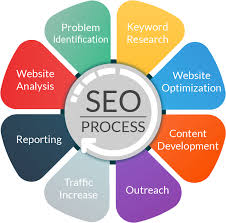The Power of Social Media Marketing
Social media marketing has revolutionised the way businesses connect with their audiences. In today’s digital age, platforms like Facebook, Instagram, Twitter, and LinkedIn have become powerful tools for reaching and engaging with customers.
One of the key benefits of social media marketing is its ability to create brand awareness. By establishing a strong presence on various social media platforms, businesses can showcase their products or services to a wide audience. This exposure not only helps in attracting new customers but also in building brand loyalty among existing ones.
Furthermore, social media marketing enables businesses to interact directly with their customers. Through comments, messages, and posts, companies can engage in real-time conversations with their audience. This level of interaction fosters trust and credibility, leading to stronger customer relationships.
Another advantage of social media marketing is its cost-effectiveness. Compared to traditional forms of advertising, such as TV or print ads, promoting a business on social media is often more affordable. This makes it an attractive option for small businesses and startups looking to maximise their marketing budget.
Moreover, social media marketing allows for targeted advertising. Platforms like Facebook and Instagram offer sophisticated targeting options based on demographics, interests, and behaviours. This enables businesses to tailor their ads to specific audience segments, increasing the likelihood of conversions.
In conclusion, social media marketing has become an indispensable tool for businesses looking to succeed in today’s digital landscape. By leveraging the power of social media platforms, companies can enhance brand visibility, engage with customers effectively, and drive business growth in a cost-efficient manner.
Understanding Social Media Marketing: Key Concepts and FAQs
- What is social media marketing?
- What are the four types of social media marketing?
- What is social media marketing with examples?
- What is the 50/30/20 rule for social media?
- What do you do as a social media marketing?
- What is a social media marketing brief?
- What a social media marketing does?
- What are the 5 steps in social media marketing?
- What are the 6 types of social media marketing?
What is social media marketing?
Social media marketing refers to the use of social media platforms to promote products or services and engage with audiences. It involves creating and sharing content on platforms like Facebook, Instagram, Twitter, and LinkedIn to reach and connect with customers. Social media marketing aims to build brand awareness, drive website traffic, generate leads, and foster customer engagement. By leveraging the power of social media, businesses can interact with their target audience in a more personalised and direct manner, ultimately enhancing their online presence and achieving their marketing objectives.
What are the four types of social media marketing?
In the realm of social media marketing, there are four primary types that businesses commonly utilise to engage with their audience and promote their brand. The first type is influencer marketing, where brands collaborate with influencers to reach a wider audience and leverage the influencer’s credibility. Secondly, content marketing involves creating and sharing valuable content to attract and retain customers. Social media advertising is another type, which utilises paid ads on platforms like Facebook and Instagram to target specific audiences. Lastly, community management focuses on building relationships with customers through active engagement and fostering a sense of community around the brand. These four types of social media marketing play crucial roles in helping businesses connect with their target audience effectively.
What is social media marketing with examples?
Social media marketing refers to the strategic use of social media platforms to promote a product, service, or brand. It involves creating and sharing content that engages with the target audience, with the goal of driving traffic, increasing brand awareness, and ultimately achieving business objectives. For example, a clothing company may use Instagram to showcase its latest collection through visually appealing posts and stories, encouraging followers to visit their website or make a purchase. Similarly, a local restaurant could utilise Facebook to promote special offers and events, engaging with customers in real-time and building a loyal community online. These examples demonstrate how businesses can leverage social media marketing to connect with their audience in meaningful ways and drive tangible results.
What is the 50/30/20 rule for social media?
The 50/30/20 rule for social media is a popular strategy that outlines how businesses should allocate their content across different types of posts. According to this rule, 50% of content should be educational and informative, 30% should be engaging and interactive, and the remaining 20% should be promotional. By following this guideline, businesses can maintain a balanced approach to their social media content strategy, ensuring that they provide value to their audience while also promoting their products or services effectively.
What do you do as a social media marketing?
In the realm of social media marketing, my role encompasses a variety of key responsibilities aimed at enhancing brand visibility, engaging with target audiences, and driving business growth. As a social media marketer, I strategize and implement effective campaigns across various platforms to promote products or services, create compelling content to resonate with followers, analyse data to measure campaign performance, and interact with customers to build lasting relationships. By staying abreast of industry trends and leveraging the power of social media tools, I aim to craft impactful strategies that elevate brand presence and foster meaningful connections with our audience.
What is a social media marketing brief?
A social media marketing brief is a document that outlines the objectives, strategies, and key details of a social media marketing campaign. It serves as a roadmap for businesses and marketers to plan and execute their social media activities effectively. The brief typically includes information such as the campaign goals, target audience demographics, content strategy, posting schedule, budget allocation, and key performance indicators (KPIs) for measuring success. By providing a clear overview of the campaign parameters and expectations, a social media marketing brief helps ensure that all stakeholders are aligned and working towards achieving the desired outcomes.
What a social media marketing does?
Social media marketing plays a pivotal role in enhancing brand visibility, engaging with target audiences, and driving business growth. By leveraging various social media platforms such as Facebook, Instagram, Twitter, and LinkedIn, businesses can promote their products or services to a wide audience. Social media marketing involves creating compelling content, running targeted advertising campaigns, and interacting with customers through comments and messages. Ultimately, the goal of social media marketing is to build brand awareness, foster customer relationships, and generate leads that can translate into sales and business success.
What are the 5 steps in social media marketing?
In social media marketing, there are five key steps that businesses can follow to maximise their impact and reach. The first step is to define clear objectives and goals for the social media strategy, outlining what the business aims to achieve through its online presence. Next, businesses should conduct thorough audience research to understand their target demographic and tailor content accordingly. The third step involves creating engaging and valuable content that resonates with the audience, driving interaction and fostering brand loyalty. Following this, businesses should implement a consistent posting schedule to maintain visibility and engagement with followers. Lastly, it is crucial to track and analyse performance metrics regularly to assess the effectiveness of the social media marketing efforts and make informed adjustments for continuous improvement.
What are the 6 types of social media marketing?
In the realm of social media marketing, understanding the various types of strategies is crucial for a successful digital presence. The six main types of social media marketing include influencer marketing, content marketing, social media advertising, viral marketing, engagement marketing, and community management. Influencer marketing involves collaborating with influential individuals to promote products or services. Content marketing focuses on creating and sharing valuable content to attract and engage the target audience. Social media advertising utilises paid ads to reach specific demographics. Viral marketing aims to create content that spreads rapidly across social platforms. Engagement marketing focuses on fostering interactions with followers to build relationships. Lastly, community management involves nurturing online communities around a brand or product to encourage loyalty and advocacy. Each type plays a unique role in shaping a comprehensive social media strategy that resonates with audiences and drives business growth.



